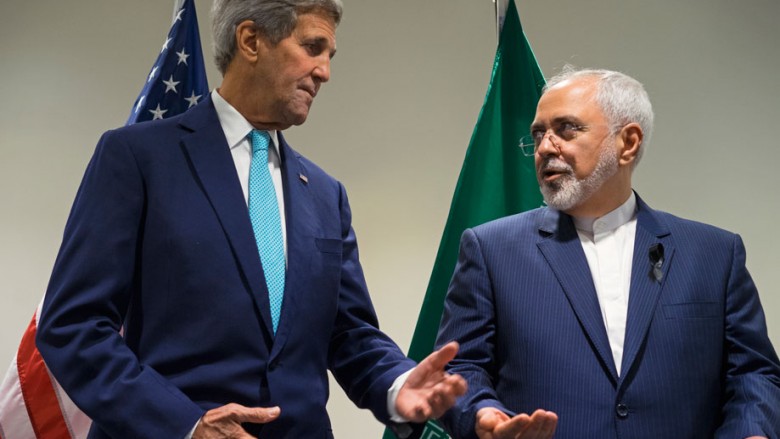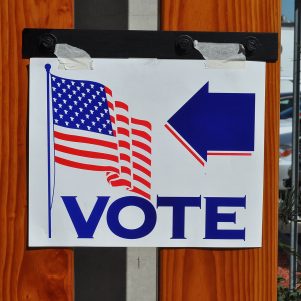Kerry praises Iran’s Zarif as ‘a patriot … who fought hard for his nation’s interests’ during nuclear negotiations
By Patrick Goodenough | November 1, 2016, 9:32 EDT
 Secretary of State John Kerry meets with Iranian Foreign Minister Mohammad Javad Zarif at United Nations headquarters. (AP Photo/Craig Ruttle, File)
Secretary of State John Kerry meets with Iranian Foreign Minister Mohammad Javad Zarif at United Nations headquarters. (AP Photo/Craig Ruttle, File) (CNSNews.com) – Secretary of State John Kerry on Monday praised his Iranian counterpart as a tough negotiator and “a patriot …who fought hard for his nation’s interests” during the marathon talks that produced the nuclear agreement.
Receiving an award in London for his role in the diplomacy that led to the deal, Kerry argued that trying to understand one’s adversaries was not doing them a favor, but was in one’s own interests; and that trying to avoid conflict was not a weakness but a strength.
Iranian Foreign Minister Javad Zarif was a co-recipient of the prize awarded by the prominent think tank Chatham House, but a “busy schedule” kept him away from Monday’s ceremony. Chatham House director Robin Niblett said it planned to present the prize to Zarif “at another time in the near future.”
(According to the foreign ministry, Zarif’s schedule Monday including meeting with a visiting Iraqi Kurdish official and Niger’s foreign minister in Tehran. He also tweeted his congratulations to Lebanon’s new Hezbollah-backed president.)
Kerry said he was sorry Zarif could not attend, and that the two had tried to coordinate schedules.
“I want to make it clear that Javad is a very tough, very capable negotiator, a patriot all the time, who fought hard for his nation’s interests, while always trying to find a constructive way to solve the problems that we both understood were gigantic hurdles for both of our countries, for both of our people, for our politics, and the divisions that exist at home for each of us.”
Kerry also praised supreme leader Ayatollah Ali Khamenei for making the decision to make a deal.
“I think ultimately to the credit of the ayatollah and Iran, they made a fundamental decision they were willing to submit to the scrutiny and give up that [nuclear] program.”
In his address to Chatham House (aka the Royal Institute of International Affairs), Kerry declared that “effective diplomacy” makes the world safer, and said the outcome of the nuclear talks was a reminder that, despite distrust ongoing differences, “when leaders are willing to at least talk and try, it turns out that not all fates are predetermined.”
He recalled the strength of opposition at home, and predictions that the nuclear standoff would lead to military confrontation.
President Obama and Iranian President Hasan Rouhani, he said, “had to take on a political risk” and had to “have the courage to seek the diplomatic path which so many were, almost throughout it, ready to predict could only be resolved probably by bombing, by war – or wouldn’t be resolved certainly in the near term.”
Secretary of State John Kerry and Iranian Foreign Minister Mohammad Javad Zarif led their teams in the nuclear talks in Switzerland and Austria. (AP Photo, File)
‘Powerful forces’
Kerry also took a swipe at Israeli Prime Minister Binyamin Netanyahu, whose strong opposition to a nuclear deal with Iran saw him address the U.S. Congress in March 2015, warning that a proposed agreement would be dangerous for Israel, the region and the world.
“There were powerful forces,” Kerry said, “that were deeply opposed to this. I mean, it’s not often that a prime minister of another country comes to the Congress and in the middle of the Congress, speaks against the sitting president’s policy. That happened, and you can imagine the forces that were unleashed as a result, and the tension that existed.”
(Netanyahu was first invited by then-House Speaker John Boehner, who was criticized for not consulting first with the White House; some Democratic lawmakers boycotted the speech.)
Kerry also referred to congressional opposition during the negotiations.
“I’ll give you a sense of how this weighed on us, because Congress was impatient for whether or not something real was happening, and because tweets were going out from various parties suggesting they’re giving away the store, they’re going to expose us to nuclear blackmail …” he said.
Once an interim deal was reached (in Nov. 2013) and made public – not because he wanted it to happen, he said, but because the process required it – the opposition grew even fiercer.
Kerry proposed that critics escalated their opposition because they realized that a deal, which they had thought would never be achieved, was now looking like becoming a reality.
“Once people who were taking for granted that this would ever go anywhere saw that there was a reality to what we were achieving, the opposition kicked into super gear and the politics became that much harder,” he said.
The administration had had to persuade Congress not to impose new sanctions on Iran, which, if they had been imposed, would have been seen by the Iranians as signaling “that we weren’t serious, and that it was the same old, same old with the Satan of the West who paid no respect to the process, and was willing to sanction the hell out of people even while they’re negotiating,” Kerry said. “You can imagine the impact.”
— Written by Patrick Goodenough











